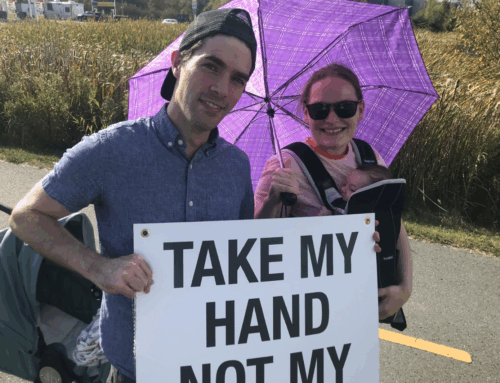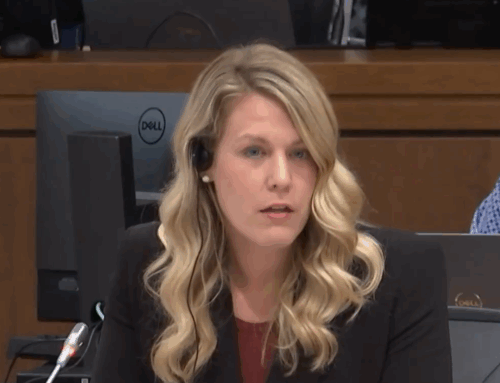
Interim writer, Josie Luetke, Talk Turkey
Josie Luetke:
Linda Gibbons and Mary Wagner have long been personal heroines of mine. When I was still just a high school student I was personally challenged by their witness and seriously wrestled with the dilemma of whether I—and the rest of the pro-life movement—should be so committed to the defense of the pre-born that the law would be rendered immaterial.
Gibbons has repeatedly transgressed Ontario’s bubble zone legislation (and prior to such legislation, a court-imposed legal injunction) by pacing back and forth in front of an abortion facility while bearing a sign with a picture of an infant and the demand: “Why mom? When I have so much love to give.” Over the past few decades, she has spent a cumulative 11 years incarcerated for her civil disobedience. Now a 76-year-old grandmother, Gibbons is being held in the Vanier Centre for Women in Milton.
Wagner, presently free, has spent a total of six years behind bars. She actually entered the “killing places” and handed out roses to the women in the waiting rooms, counselling them to spare the lives of their pre-born children.
Many other Canadians have been arrested in the past for their pro-life efforts, and a number of brave Americans are currently imprisoned for blocking access to abortion facilities or for other pro-life interventions.
I believe I’ve settled the dilemma of my youth—God calls each of us to respond to the silent cry of the pre-born in different ways during different periods of our lives. Even Gibbons and Wagner have taken breaks from this type of witnessing, to fulfill other responsibilities, and the extent to which they violate the law also varies. Suffering imprisonment is a great sacrifice and requires great discernment.
Still, while I’ve yet to find myself in handcuffs, I retain my immense admiration for those peaceful pro-lifers who do, and I thought such admiration was universal within the movement. As it turns out, it’s not.
Some make a blanket assertion that it’s just wrong to ever break the law. This objection is silly. As the law of the land becomes ever more ridiculous (and unjust), I’d hope the folly of blind devotion to it becomes apparent. We obey a higher law—God’s.
More commonly, I see pro-lifers criticizing “rescue” and similar non-violent but unlawful pro-life witness for not being “strategic” or “effective.”
Former Planned Parenthood clinic director turned pro-lifer Abby Johnson, for instance, said, “I am not someone who believes that this is the most effective form of activism,” when commenting recently on Fox News about pro-lifers detained for violating the United States’ Freedom of Access to Clinic Entrances (FACE) Act. She said, “While I respect their position, I respect their activism, it’s not something that I think we should continue, something we should be doing.”
Writing in The Federalist, Lauren Muzyka, president and CEO of Sidewalk Advocates for Life, contrasted what she framed as “risky bravado” with her own organization’s “strategic, life-saving outreach.” She charges that pro-life prisoners of conscience are “removed from ministry, tied up in needless litigation, and separated from the everyday conversations that change hearts and minds.”
Katie Somers, director of outreach for Toronto Right to Life, posted on X last year, “I know we are most effective if we are not in prison. We have to draw a clear and solid line in the pro-life movement, and doing anything illegal must be off limits.”
They are mistaken.
Rescues have saved lives, which Monica Migliorino Miller, director of Citizens for a Pro-life Society, who has herself participated in this activism, attests to in a reply to Muzyka that The Federalist published in March. She points out that at every step in the legal system, the minds and hearts of others can be changed, and as Gibbons and Wagner will also contend, pro-life ministry continues in prison. Fellow inmates are among the most vulnerable to abortion, and they (Gibbons and Wagner) have unique access to them behind bars.
Just as early Christianity spread through martyrdom, so can our pro-life martyrs prompt reflection, inspire others, and win converts to the cause.
Progressive Anti-Abortion Uprising (PAAU), a left-wing pro-life group (which I will compliment but cannot endorse), defends rescue beautifully on their website, pointing out that it “challenges the legitimacy of the status quo currently protected by existing law.” They appeal to the reader: “Your physical presence in (the potential abortion victim’s) moment of suffering matters. It is meaningful, even if the baby will never know your love; those who observe your act of love for them will know it.”
More importantly, I hope this criticism exposes “effectiveness” as inadequate as a singular lens for assessing the merits of any pro-life action.
When Jesus leaves the 99 to rescue the one sheep—is that effective?
Again, I defer to PAAU: “Preborn people deserve to have someone show up for them. An attempt to rescue a preborn child may be the only act of love they ever receive before they are murdered.”
Migliorino Miller writes, “If women still opt to kill their children, at least a few pro-lifers will stay in the ‘dark holes’ with the unwanted unborn, remaining as a witness to the sanctity of their lives.”
She concludes, “The question is not how many babies have been saved, but how many babies have been loved.”
I don’t know if I should take criticism of rescue and other “criminal” pro-life tactics at face value or speculate about other motives. Muzyka, for her part, suggested that law-breaking activists just want the excitement or the attention, so I feel I have the license to warn against a desire to conform to some type of “respectability politics” that I’ve written about previously, or a desire to justify one’s own enjoyment of freedom by blaming those comrades who languish in prison.
The pro-life movement needs many different types of activism, including those that are more confrontational and more demanding. When good people step up, turn around, and put their hands behind their backs, we owe them a debt of gratitude—hands together now.




